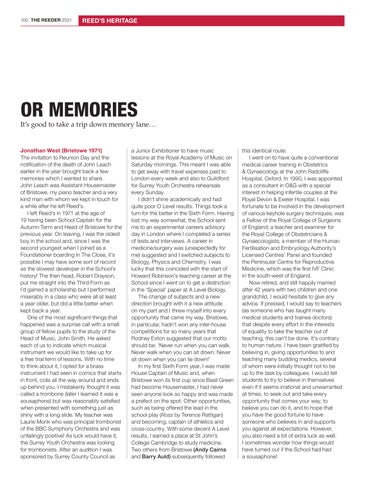100 THE REEDER 2021
REED’S HERITAGE
OR MEMORIES
It’s good to take a trip down memory lane… Jonathan West (Bristowe 1971) The invitation to Reunion Day and the notification of the death of John Leach earlier in the year brought back a few memories which I wanted to share. John Leach was Assistant Housemaster of Bristowe, my piano teacher and a very kind man with whom we kept in touch for a while after he left Reed’s. I left Reed’s in 1971 at the age of 19 having been School Captain for the Autumn Term and Head of Bristowe for the previous year. On leaving, I was the oldest boy in the school and, since I was the second youngest when I joined as a Foundationer boarding in The Close, it’s possible I may have some sort of record as the slowest developer in the School’s history! The then head, Robert Drayson, put me straight into the Third Form as I’d gained a scholarship but I performed miserably in a class who were all at least a year older, but did a little better when kept back a year. One of the most significant things that happened was a surprise call with a small group of fellow pupils to the study of the Head of Music, John Smith. He asked each of us to indicate which musical instrument we would like to take up for a free trial term of lessons. With no time to think about it, I opted for a brass instrument I had seen in comics that starts in front, coils all the way around and ends up behind you. I mistakenly thought it was called a trombone (later I learned it was a sousaphone) but was reasonably satisfied when presented with something just as shiny with a long slide. My teacher was Laurie Monk who was principal trombonist of the BBC Symphony Orchestra and was unfailingly positive! As luck would have it, the Surrey Youth Orchestra was looking for trombonists. After an audition I was sponsored by Surrey County Council as
a Junior Exhibitioner to have music lessons at the Royal Academy of Music on Saturday mornings. This meant I was able to get away with travel expenses paid to London every week and also to Guildford for Surrey Youth Orchestra rehearsals every Sunday. I didn’t shine academically and had quite poor O Level results. Things took a turn for the better in the Sixth Form. Having lost my way somewhat, the School sent me to an experimental careers advisory day in London where I completed a series of tests and interviews. A career in medicine/surgery was (unexpectedly for me) suggested and I switched subjects to Biology, Physics and Chemistry. I was lucky that this coincided with the start of Howard Robinson’s teaching career at the School since I went on to get a distinction in the ‘Special’ paper at A Level Biology. The change of subjects and a new direction brought with it a new attitude on my part and I threw myself into every opportunity that came my way. Bristowe, in particular, hadn’t won any inter-house competitions for so many years that Rodney Exton suggested that our motto should be: ‘Never run when you can walk. Never walk when you can sit down. Never sit down when you can lie down!’ In my first Sixth Form year, I was made House Captain of Music and, when Bristowe won its first cup since Basil Green had become Housemaster, I had never seen anyone look so happy and was made a prefect on the spot. Other opportunities, such as being offered the lead in the school play (Ross by Terence Rattigan) and becoming, captain of athletics and cross-country. With some decent A Level results, I earned a place at St John’s College Cambridge to study medicine. Two others from Bristowe (Andy Cairns and Barry Auld) subsequently followed
this identical route. I went on to have quite a conventional medical career training in Obstetrics & Gynaecology at the John Radcliffe Hospital, Oxford. In 1990, I was appointed as a consultant in O&G with a special interest in helping infertile couples at the Royal Devon & Exeter Hospital. I was fortunate to be involved in the development of various keyhole surgery techniques; was a Fellow of the Royal College of Surgeons of England; a teacher and examiner for the Royal College of Obstetricians & Gynaecologists; a member of the Human Fertilisation and Embryology Authority’s Licensed Centres’ Panel and founded the Peninsular Centre for Reproductive Medicine, which was the first IVF Clinic in the south-west of England. Now retired, and still happily married after 42 years with two children and one grandchild, I would hesitate to give any advice. If pressed, I would say to teachers (as someone who has taught many medical students and trainee doctors) that despite every effort in the interests of equality to take the teacher out of teaching, this can’t be done. It’s contrary to human nature. I have been gratified by believing in, giving opportunities to and teaching many budding medics, several of whom were initially thought not to be up to the task by colleagues. I would tell students to try to believe in themselves even if it seems irrational and unwarranted at times, to seek out and take every opportunity that comes your way, to believe you can do it, and to hope that you have the good fortune to have someone who believes in and supports you against all expectations. However, you also need a bit of extra luck as well. I sometimes wonder how things would have turned out if the School had had a sousaphone!






















